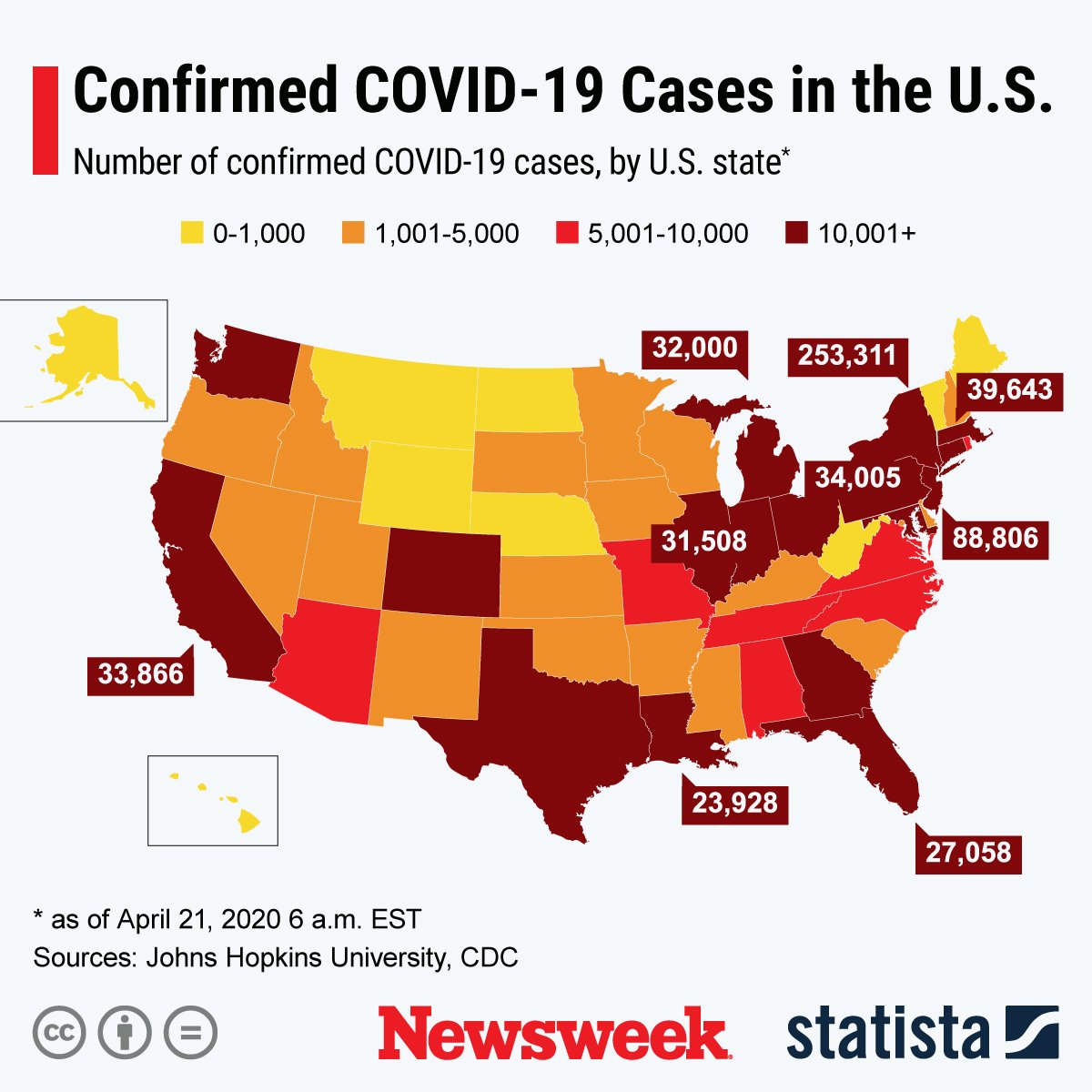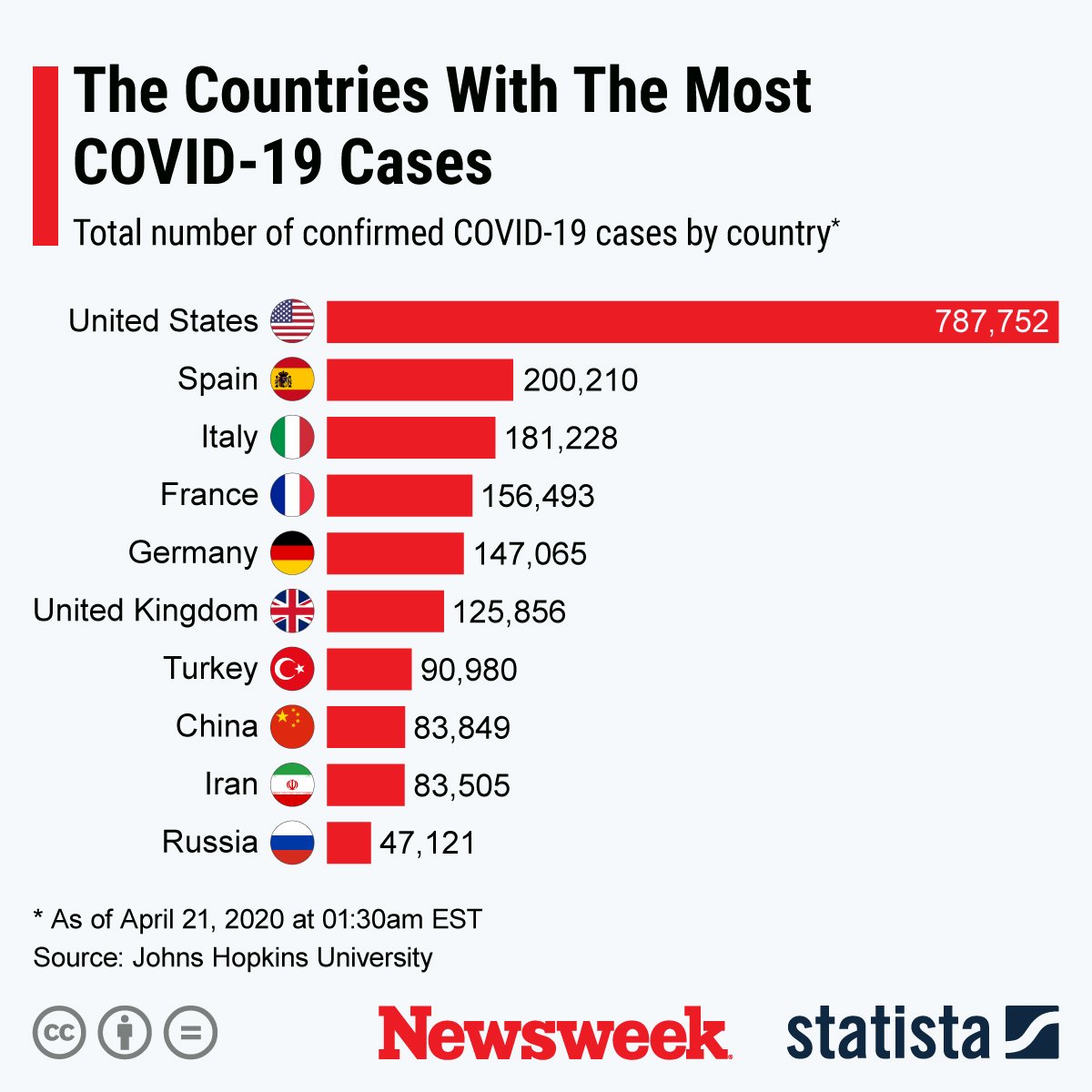The novel coronavirus has infected more than 2,501,000 people across the globe, with the highest number of infections in the U.S.
Spain, Italy, France and Germany are also in the top five countries with the most confirmed cases, as of Tuesday, according to the latest figures from Johns Hopkins University.
With nearly a third of the world's confirmed cases in the U.S., the country remains the epicenter of the outbreak. It also has more deaths from the virus than any other country in the world, with over 42,500 fatalities, as of Tuesday.
The country's worst-hit state is New York, which has seen at least 247,512 cases to date, New York Governor Andrew Cuomo confirmed at a press conference on Monday.
But the outbreak has recently shown signs of slowing down in the state. On Sunday, Cuomo noted the state may have passed the point of the outbreak's severity.
"We believe NY is past the peak and we are now descending the other side of the mountain," Cuomo wrote in a post Sunday on his official Twitter account.

He added: "We have slowed the infection rate so that every 10 people infect about 9 people. That means that the outbreak is slowing, not growing. But it leaves very little room for error. We need [to] bring the infection rate down even more in order to safely reopen the economy," he said in another tweet.
But Cuomo warned on Monday that "This crisis is not over," at the press conference.
He added that "what we do today will determine tomorrow...we make smart decisions, you will see smart outcomes in two weeks. We make bad decisions, you will see bad outcomes in two weeks."
New Jersey is the country's second worst-hit state, with at least 88,806 confirmed infections, followed by Massachusetts (at least 39,643 cases), Pennsylvania (33,914) and California (33,865), which are the four states with the most cases after New York.
The graphic below, provided by Statista, shows the number of confirmed COVID-19 cases, the disease caused by the new strain of coronavirus, in a selection of states.

Cases in Spain and Italy continue to grow but both countries have reported a mostly declining trend in the number of new deaths and cases over recent days.
Both Italy and Spain also reported a recent drop in the number of active cases, which includes the number of patients currently being treated in hospital or recovering at home.
On Monday, Italy saw its first such decline since the outbreak began. Spain reported its second decline in active cases this month on Monday, seeing a dramatic drop of more than 10,000 from Sunday, according to the latest figures from Spain's ministry of health.
The virus, which was first reported in Wuhan, China, has spread to at least 185 countries and regions across the globe. More than 695,700 have recovered from infection, while over 171,800 have died.
The graphic below, provided by Statista, illustrates countries with the most confirmed COVID-19 cases.

Data on COVID-19 cases is from Johns Hopkins University unless otherwise stated.
Centers for Disease Control and Prevention Advice on Using Face Coverings to Slow Spread of COVID-19
- CDC recommends wearing a cloth face covering in public where social distancing measures are difficult to maintain.
- A simple cloth face covering can help slow the spread of the virus by those infected and by those who do not exhibit symptoms.
- Cloth face coverings can be fashioned from household items. Guides are offered by the CDC. (https://www.cdc.gov/coronavirus/2019-ncov/prevent-getting-sick/diy-cloth-face-coverings.html)
- Cloth face coverings should be washed regularly. A washing machine will suffice.
- Practice safe removal of face coverings by not touching eyes, nose, and mouth, and wash hands immediately after removing the covering.
World Health Organization advice for avoiding spread of coronavirus disease (COVID-19)
Hygiene advice
- Clean hands frequently with soap and water, or alcohol-based hand rub.
- Wash hands after coughing or sneezing; when caring for the sick; before, during and after food preparation; before eating; after using the toilet; when hands are visibly dirty; and after handling animals or waste.
- Maintain at least 1 meter (3 feet) distance from anyone who is coughing or sneezing.
- Avoid touching your hands, nose and mouth. Do not spit in public.
- Cover your mouth and nose with a tissue or bent elbow when coughing or sneezing. Discard the tissue immediately and clean your hands.
Medical advice
- Avoid close contact with others if you have any symptoms.
- Stay at home if you feel unwell, even with mild symptoms such as headache and runny nose, to avoid potential spread of the disease to medical facilities and other people.
- If you develop serious symptoms (fever, cough, difficulty breathing) seek medical care early and contact local health authorities in advance.
- Note any recent contact with others and travel details to provide to authorities who can trace and prevent spread of the disease.
- Stay up to date on COVID-19 developments issued by health authorities and follow their guidance.
Mask and glove usage
- Healthy individuals only need to wear a mask if taking care of a sick person.
- Masks are effective when used in combination with frequent hand cleaning.
- Do not touch the mask while wearing it. Clean hands if you touch the mask.
- Learn how to properly put on, remove and dispose of masks. Clean hands after disposing of the mask.
- Do not reuse single-use masks.
- Regularly washing bare hands is more effective against catching COVID-19 than wearing rubber gloves.
- The COVID-19 virus can still be picked up on rubber gloves and transmitted by touching your face.
Uncommon Knowledge
Newsweek is committed to challenging conventional wisdom and finding connections in the search for common ground.
Newsweek is committed to challenging conventional wisdom and finding connections in the search for common ground.
About the writer
Soo Kim is a Newsweek reporter based in London, U.K. She covers various lifestyle stories, specializing in travel and health.
Soo ... Read more
To read how Newsweek uses AI as a newsroom tool, Click here.








